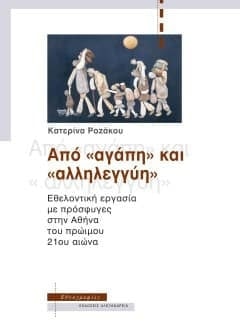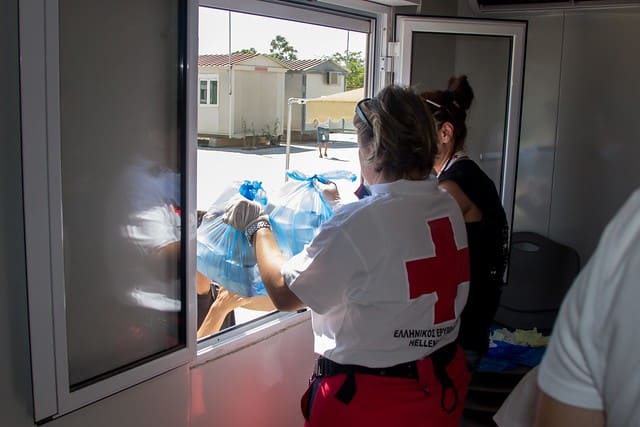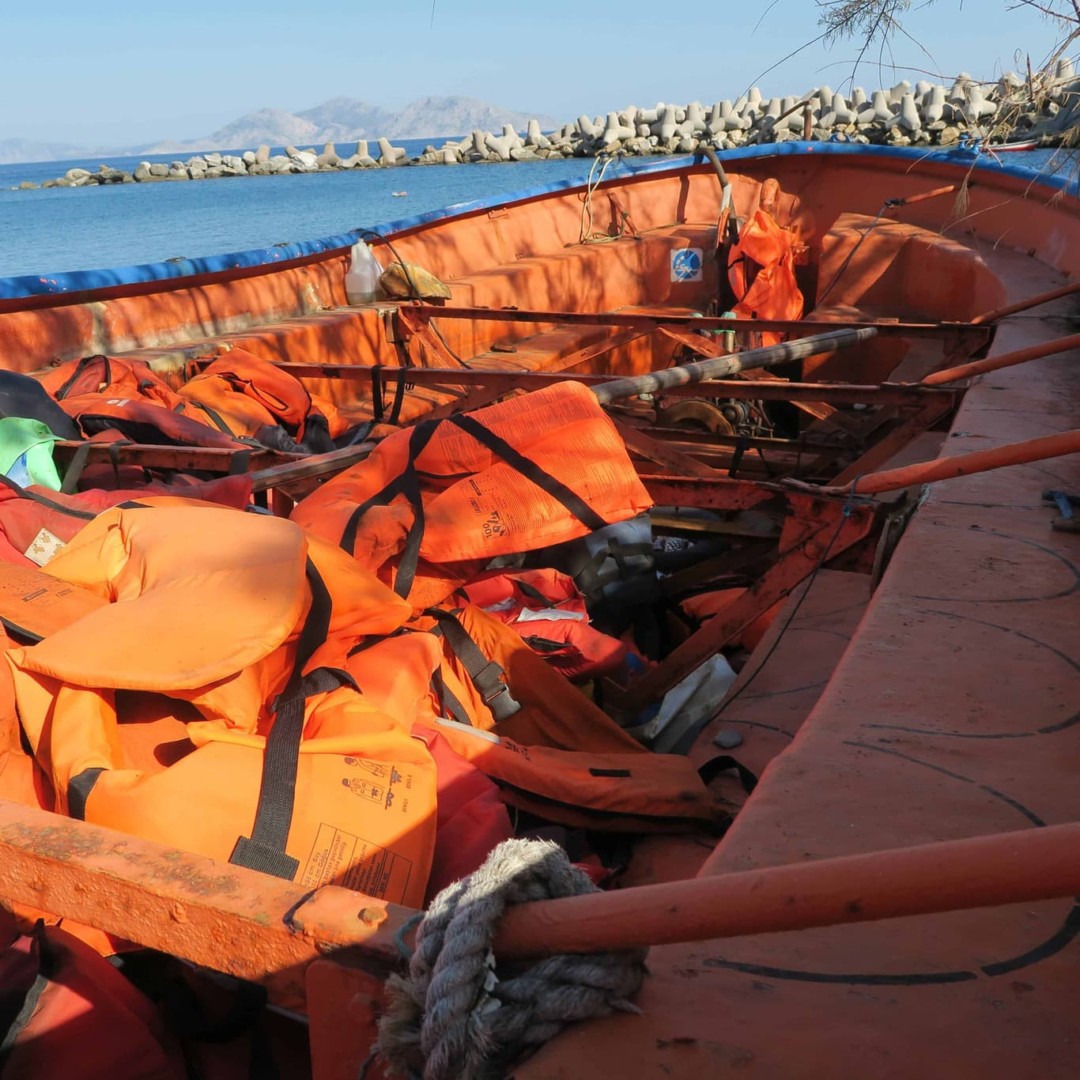Out of “love” and “solidarity”, an ethnography written in Greek, is Katerina Rozakou’s insightful study of two volunteer organizations that helped refugees in Athens in the early 2000s. Since the book is not yet available in English and given the importance of Greece at the center of the refugee and migration debacle, I highlight here some of its major contributions.
 At the core Out of “love” and “solidarity” lies a distinction between two versions of volunteerism: humanitarian and militant as defined by the primary aims and motivations that underlie them, i.e. “love” and “solidarity,” respectively. Rozakou arrives at this distinction through an extensive fieldwork with two volunteer organizations, the Hellenic Red Cross and the Voluntary Work Athens.
At the core Out of “love” and “solidarity” lies a distinction between two versions of volunteerism: humanitarian and militant as defined by the primary aims and motivations that underlie them, i.e. “love” and “solidarity,” respectively. Rozakou arrives at this distinction through an extensive fieldwork with two volunteer organizations, the Hellenic Red Cross and the Voluntary Work Athens.
In the Introduction, Rozakou uses a chance encounter between some members of the two organizations that sets the tone of the discussion that follows: despite the polite and amicable atmosphere, it was obvious that they ‘belonged to different worlds’ (15). Presented with admirable insight, the rest of the study is dedicated to a systematic analysis of not only fundamental differences but also similarities between these two approaches to volunteerism.
With impressive clarity, throughout the book, Rozakou manages to make sense of what must have been fragmented if not unruly data.
The book begins by an overview of the concept of the ‘volunteer,’ constructed as a model citizen working for the ‘common good,’ and the particular way in which it developed in Greece in the context of Europeanization and modernization. While the image of a volunteer as a moral citizen emerged in various places, its absence in Greece was identified as a problem. It was considered to reflect the ‘unfortunate’ fact of the country’s incomplete modernisation. Rozakou positions herself against this view, by pointing to the existence of militant volunteerism, which, as she shows, does not conform to the conventional ideas of volunteerism but follows a different logic.
Rozakou then relates her work to scholarship on ‘gift’ and other proximate concepts, most notably ‘hospitality’ (filoxenia), which ‘lies in the heart of the self-representation of the Greek state’ (28). From this discussion we learn, among other things, that the general uneasiness to accept gifts in Greece is thought to be rooted in the dominance of the values of autonomy and freedom, and that, moreover, the unilateral generosity, which Greek communities have long shown to foreigners serves to buttress and recognise the host’s social value (27).
In this context, ‘hospitality’ is used to demarcate the boundaries between the foreign and the familiar, constituting, ultimately, a means of controlling the “other” (28).
Zooming closer into the two organizations, in Rozakou’s analysis the Hellenic Red Cross emerges as a place of motherly care and of deference to authority. The organization’s mission of humanitarian volunteerism is to help the fellow human; it is nominally apolitical and based on the notions of ‘selflessness,’ ‘compassion,’ ‘sacrifice,’ and ‘service’ (83). Its predominantly female volunteers who turn with ‘love’ towards those ‘in need.’ Their activity takes place in the context of strictly hierarchical relationships, constituted on the one hand within the Hellenic Red Cross (i.e. between older and newer volunteers, professional members, leadership), and on the other hand between refugees and volunteers, as takers and givers of the ‘gift,’ respectively.
Militant volunteerism, in turn, is epitomized by the Voluntary Work Athens. Situated on the political left, this organization is programmatically opposed to any bureaucratic and hierarchical structure and instead strives to create equal and vertical relationships between volunteers and refugees (which is why participants are labelled as ‘activists’ rather than ‘volunteers’). The central notion guiding their engagement is ‘solidarity’: the idea that the ultimate purpose of assisting the marginalized should be to empower and emancipate them. Instead of gifts or handouts, the purpose of voluntary work or activism should be to build relationships among locals and refugees as equals. The revulsion from any type of hierarchy in this organization was evident in the ad-hocism and spontaneity that at times verged into chaos, as Rozakou so aptly describes (131).

Rozakou delves into the work of the two organizations and describes their practices in detail including activities such as a soup-kitchen organized by the Hellenic Red Cross and a failed attempt to clean up an occupied building by members of the Voluntary Work Athens together with residents. Especially intriguing is Rozakou’s description of a visit to a refugee camp. She shows how Hellenic Red Cross volunteers contributed to the proper functioning of the camp, an enclosed site of care as well as control (201). This stands in stark contrast to the activities of Voluntary Work Athens on the streets of the Greek capital, where activists attempted to approach refugees in parks, squares and old buildings, i.e. in “their” own space (213).
As a comment on the antagonism between different solidarity initiatives and humanitarian organisations directed towards refugees, the book ends with a discussion of the emergence of ‘solidarity’ as a focal point of discourse and practice in the wake of the refugee ‘crisis’ in Greece. This approach envisioned first and foremost the creation of an equal society in the spirit of militant voluntarism, as opposed to humanitarianism which contributed to and even assumed a leading role in ‘managing’ the crisis (242).
This demonstrates the contemporary relevance of research that was conducted more than a decade ago.
Out of “love” and “solidarity” is an excellent and timely piece of research. It would have profited from a more systematic analysis of gender, however. Gender is discussed in detail in relation to the Hellenic Red Cross volunteers who are predominantly female and whose approach to refugees and clients is driven by ‘love’ and a sense of ‘duty.’ Yet, it remains unclear whether this gender aspect is a definitional characteristic of humanitarian volunteerism.
In my view, what is most original and fascinating about Rozakou’s work is the way she receptively identifies and interprets the dilemmas, complexities, and contradictions of volunteerism encountered by her informants and herself:
The disappointment and bewilderment caused by the fact that refugees sometimes reject the ‘help’ they receive (be it a carpet or foodstuff).
The tension between the sincere altruism of Hellenic Red Cross volunteers and their desire for public recognition and attainment of social status. The constant self-reflection and self-doubt of the Voluntary Work Athens activists, who, fully aware of the power-asymmetry inherent in the ‘gift’ and strove to avoid it, yet relapsed into ‘paternalistic relations of old-style philanthropy’ (236) as the only means to decrease the social distance between themselves and the refugees.
In summary, there is much to praise about this book. It is an erudite study that combines theoretical depth and analytical rigour with a rich empirical material, written in an engaging style. It is highly relevant not only for social anthropologists, but also for sociologists and political scientists who wish to deepen their understanding of volunteerism and civil society. Equally importantly, given that it is written in Greek, in a sophisticated yet accessible style, Out of “love” and “solidarity” can be recommended to a broader public, including volunteers and activists.
The author is responsible for the translations. An English-language summary of the book can be found here.



